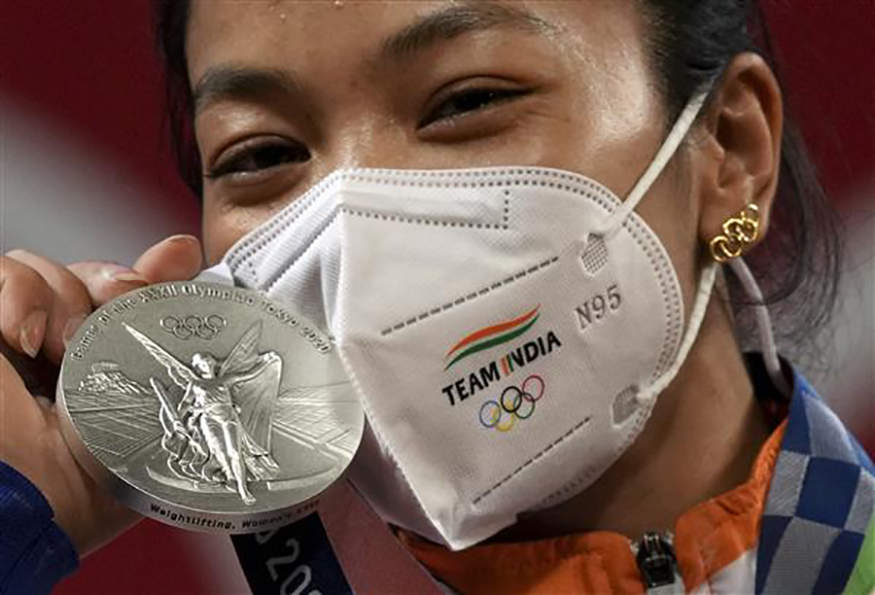We don't know when the whole trend started, but we have always seen athletes biting on their medals during a photo op after the event.
It's no different at the 2020 Tokyo Olympics, as the world's greatest athletes continue the trend of 'savouring' their victory.
They took to Twitter to confirm that yes; the medals are not edible.
"We just want to confirm that Tokyo 2020 medals are not edible! Our medals are made from material recycled from electronic devices donated by the Japanese public.
"So, you don't have to bite them... but we know you still will,” read the tweet.
To really drive the point home, the organisers sent out another playful tweet, this time reminding the athletes to 'unwrap' the medals before sinking their pearly whites into it.
While we are pretty sure that the athletes are educated enough to know that the medals are not edible, the organisers probably published the reminders to warn the athletes about the unhygienic consequences of putting something that's been touched by many people into their mouths, especially since that we're living with a pandemic at the moment.
That is because the medals were made using millions of discarded electronic waste such as mobile phones and household items.
It took the organisers two years to collect enough material to make the Olympics medals, with contributions largely coming from the country’s wards, cities, and villages.

In the end, the organisers managed to collect 32 kilograms of gold, 3,500 kilograms of silver, and 2,200 kilograms of bronze.
So, really; the athletes at this year's Olympic Games could be biting on someone's old Nokia 3310 instead of real gold.
It's no different at the 2020 Tokyo Olympics, as the world's greatest athletes continue the trend of 'savouring' their victory.
Don't put it in your mouth
However, the organisers of the sporting event has recently playfully reminded competing athletes to not bite on their medals.They took to Twitter to confirm that yes; the medals are not edible.
"We just want to confirm that Tokyo 2020 medals are not edible! Our medals are made from material recycled from electronic devices donated by the Japanese public.
"So, you don't have to bite them... but we know you still will,” read the tweet.
We just want to officially confirm that the #Tokyo2020 medals are not edible!
— #Tokyo2020 (@Tokyo2020) July 25, 2021
Our ??? medals are made from material recycled from electronic devices donated by the Japanese public.
So, you don't have to bite them... but we know you still will ? #UnitedByEmotion
To really drive the point home, the organisers sent out another playful tweet, this time reminding the athletes to 'unwrap' the medals before sinking their pearly whites into it.
You got to take the wrapper off first to get to the chocolate on the inside! ??
— #Tokyo2020 (@Tokyo2020) July 26, 2021
A huge congratulations to every medallist, athlete, official, volunteer, and the fans who made today special.
We can't wait to do it all over again on Day 4⃣ of #Tokyo2020 #UnitedByEmotion pic.twitter.com/MI40LOS12P
While we are pretty sure that the athletes are educated enough to know that the medals are not edible, the organisers probably published the reminders to warn the athletes about the unhygienic consequences of putting something that's been touched by many people into their mouths, especially since that we're living with a pandemic at the moment.
No gold inside
The trend of athletes biting their medals might have stemmed from the habit of traders back in the olden days where they bite into gold coins to verify their authenticity, but athletes will not find any gold in their 2020 Tokyo Olympics gold medals.That is because the medals were made using millions of discarded electronic waste such as mobile phones and household items.
It took the organisers two years to collect enough material to make the Olympics medals, with contributions largely coming from the country’s wards, cities, and villages.

In the end, the organisers managed to collect 32 kilograms of gold, 3,500 kilograms of silver, and 2,200 kilograms of bronze.
So, really; the athletes at this year's Olympic Games could be biting on someone's old Nokia 3310 instead of real gold.






